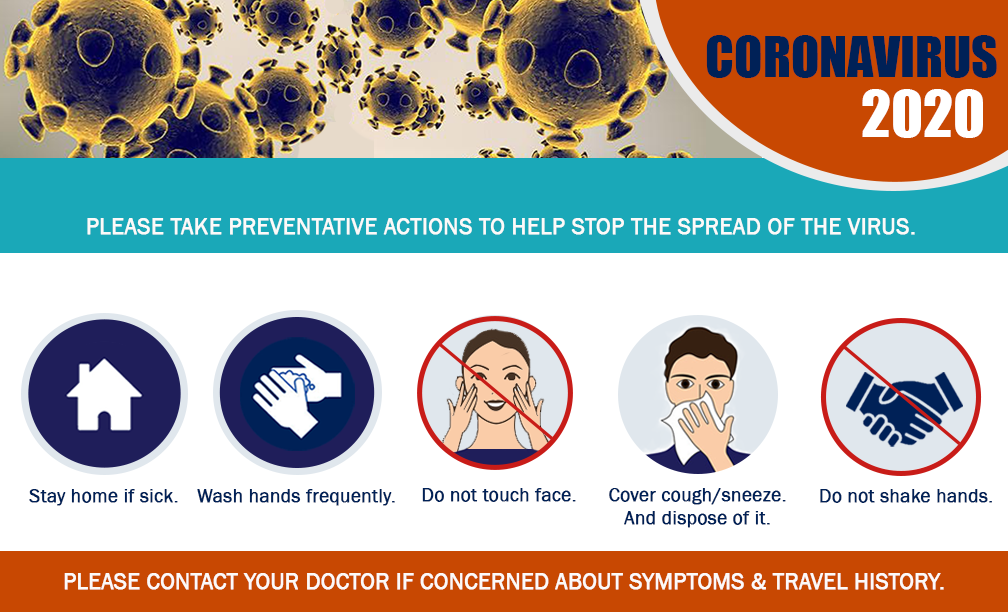Get The Latest Updates On New Arrivals, Sales + Promotions

How To Plan A Wedding Amid The Coronavirus Outbreak: Tips & Advice
Wedding planning during a COVID-19 outbreak can be stressful, but here are some quick tips to consider to help you manage this stress and keep your guests happy and healthy.
First, in order to help with your wedding planning, we need to understand how the Coronavirus is spread? According to the CDC:
The virus is thought to spread mainly from person-to-person.
- Between people who are in close contact with one another (within about 6 feet).
- Through respiratory droplets produced when an infected person coughs or sneezes.
These droplets can land in the mouths or noses of people who are nearby or possibly be inhaled into the lungs.
The best way to prevent illness is to avoid being exposed to this virus.
Symptoms & Warning Signs To Watch For In Arriving Wedding Guests:
- Pay attention for potential COVID-19 symptoms including, fever, cough, and shortness of breath. If you feel like you are developing symptoms, call your doctor.
- If you develop emergency warning signs for COVID-19 get medical attention immediately. In adults, emergency warning signs*:
- Difficulty breathing or shortness of breath
- Persistent pain or pressure in the chest
- New confusion or inability to arouse
- Bluish lips or face

(Update 3/20/20)
IMPORTANT
Given how quickly this pandemic is growing, if you are a bride or event planner planning a wedding this year, we are here for you. Check back daily and we will post resources, tips, and things we learn from our partners on how to navigate these challenges. Our job is to be a valuable resource and knowledge center to help you.
Please do the following immediately in this order:
- Check with your venue to ensure they are still open to handle your event. Many restaurants, hotels, and public places of gathering are now closed.
- If your event has to be postponed, please check with your vendors to reschedule your dates ASAP (i.e. first-come, first-serve). There will be a backlog of weddings and other events due to the sheer number of events that will have to be canceled in the next 2-4 months. Keep in mind the 2020 most popular wedding dates. Schedule a group call with ALL of them to plan the date and have a backup date ready just in case.
- Here is a map of Coronavirus cases on a state-by-state basis. If your state is seeing cases grow, expect more business to shut down with extremely short notice.
- Click here to see a list of State Disaster Areas declared due to Coronavirus. If your State and/or County is listed, it is very likely your wedding will need to be canceled or postponed.
- Communicate, communicate, communicate. Everyone is hurt by this virus, so we all need to work together to help one another get through this. Keep in mind your health - both physical and mental - comes first.
Event Planners & Wedding Vendors
If your business has been adversely impacted by COVID-19, click here to learn about SBA Disaster Loan Assistance.
Overall Tips
During The Wedding Ceremony:
- Consider placing the rows of seating further apart to minimize close contact.
- Provide fresh disposable tissues/hand sanitizer on each seat for guests to help prevent open cough.
- Limit beverage sharing. Avoid offering drinks and beverages at "communal" stations and provide bottled water or drinks on each seat in order to minimize person to person contact.
- Try and keep the elderly and children separate from the rest of your guests.
- Have the hotel or venue staff thoroughly disinfect surfaces like doorknobs, chairs, and handrails regularly throughout the event.
- For indoor weddings, increase ventilation by opening windows or adjusting air conditioning.
- Have guests clean their hands at the door and have your MC encourage your family and guests to wash their hands regularly.
Per the CDC, older adults and people who have severe underlying chronic medical conditions like heart or lung disease or diabetes seem to be at higher risk for developing more serious complications from COVID-19 illness. If possible, consider using videoconferencing technology to help them enjoy your special day without being exposed to hundreds of guests. For example, FaceTime and WhatsApp can be useful for them to see the event without being exposed to many ceremony and reception guests.
Per the CDC, high-risk wedding guests would include, but is not limited to:
- Older Adults
- Pregnant Women
- Children
- People with Diabetes, Heart Disease, Lung Disease
During the Wedding Reception:
- Create assigned seating vs. open seating. You can separate the most vulnerable guests (elderly and children) from the rest of the guests.
- Try and spread the space between your reception tables and chairs to minimize contact. Minimum 6 feet distance apart.
- Limit food sharing. Confirm with your caterer how to ensure food is safely distributed, including but not limited to small plates, appetizers, and buffet-style options.
- Ensure catering and hotel staff and their close contacts practice strict hygiene.
- Ensure there are enough sanitary products in the bathrooms, and encourage handwashing with signs at the bathroom sinks.
- Create signage to reinforce good hygiene habits. Create reminders to avoid touching faces, and cover coughs and sneezes.
- For indoor receptions, make sure to have the venue staff increase ventilation by opening as many windows as possible and adjusting air conditioning. Well-ventilated spacing is extremely important.
- Regularly disinfect areas with large gatherings (i.e. guest book table)
Overall Tips During Wedding Planning
1. Take Responsibility.
Don't try and cover-up that the COVID-19 concern isn't on the mind of your guests who do attend your wedding. Instead of not addressing the elephant in the room, create signage explaining the precautions you (and your wedding vendors) have taken to ensure your guests are safe and have a good time. Use phrases like, "In light of recent events" or "We want you to have a happy and healthy time, so here is what we have done...." to make sure your day stays special.
2. Be Proactive, Be Transparent, Be Accountable
Your vendors are your best friends when it comes to having them shoulder the burden of taking extra precautions for your wedding ceremony and reception. Ask questions on what they are proactively doing to ensure your wedding day goes off without a hitch.
Get help and do not go it alone. Ask all of your vendors what they can do to help you minimize the impact of the Coronavirus. Force them to think of ways to make your guests feel safe, secure, and at ease.
Communication is key. Your vendors should be talking to each other and working to alleviate your concerns for your special day. Also, ask them the hard questions:
1. Ask the hotel what they are doing to make your event go as smoothly as possible? Ask about the bathrooms and the public spaces. Is there hand sanitizer and tissue readily available? How are they handling their facilities to ensure all guests are not in danger of exposure?
2. Ask the DJ what is the best way to request songs and minimize contact?
3. Ask the caterer what they can do to help minimize exposure at buffet lines, appetizer plates, etc.?
4. Ask the event planner for advice on how the wedding couple (and family) should greet people without touching everyone's hands - a nod, smile and simple thank you for coming without shaking hands is one option.
5. Make the event planner the "bad guy" - as a couple, if you feel uncomfortable telling sick guests to stay their distance, have the event planner do it and come up with wording that you both can agree too.
3. Get Ahead of It
If your wedding is still months away, start communicating in your invitations, wedding website, and on social media to address your guests' concerns. What are you doing to ensure a safe wedding day? Leave the fine points to your wedding vendors, but at least communicate with your guests. Don't be afraid to ask guests who recently traveled abroad to visit the CDC website for high-risk travelers and follow their precautions:

4. Be Ready To Handle Social Media / Website Inquiries
Some of your guests will ask you what you are doing to keep them safe, so have prepared answers for them. Have a plan and review it with your spouse, go over it with your family, and implement it with your event coordinator.
5. Avoid Knee-Jerk Reactions
Communication is key. Be transparent about how you will handle the Coronavirus outbreak during your wedding planning, and offer helpful tips and solutions to minimize its spread. Don't make crazy decisions without seeking advice from your vendors on how to handle your venue, food, and accommodations. We would highly recommend spending some time on the CDC website when looking for answers to your FAQs.


Good To Know Wedding Planning Information Regarding Coronavirus:
- Steps To Prevent Illness
- What To Do If Wedding Guests Are Sick
- Information for Wedding Guests Coming Back from High-Risk Countries
- "High Risk" Groups of Your Wedding Guest List
Here's A Great Video On Hand Washing: Gordon Ramsay shows you how to wash your hands (1 min).
Update: This is an ongoing blog post that will be updated as we receive more advice from event planners and brides. Have advice to share? Please contact us to let us know how you are managing this pandemic by sharing your wedding planning tips. We will share these tips with other brides and event planners and credit you on the post. (Last update 3/20/20)













